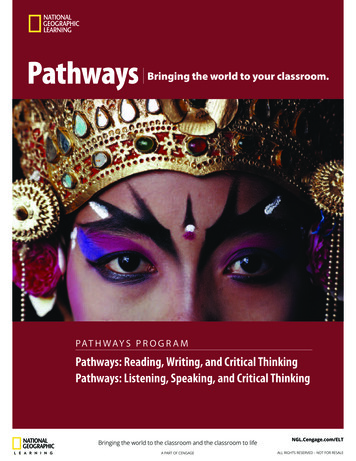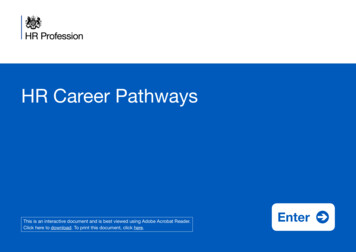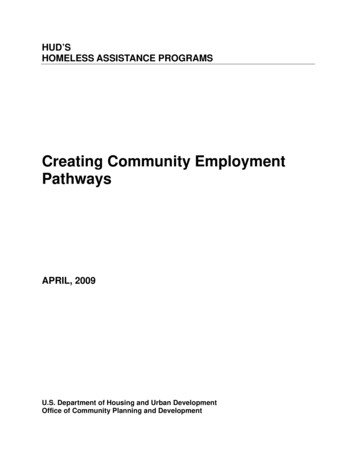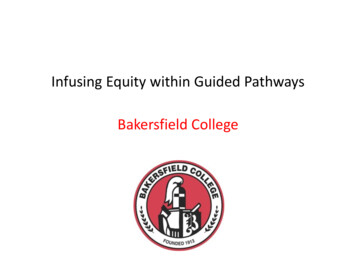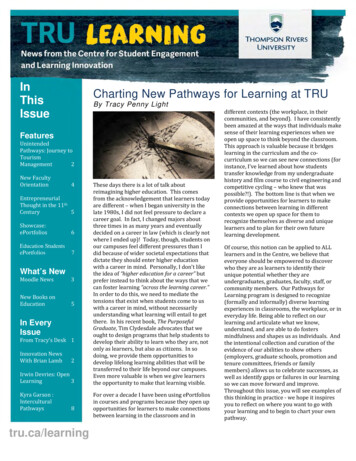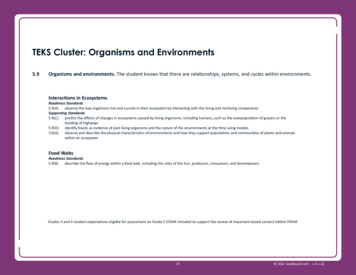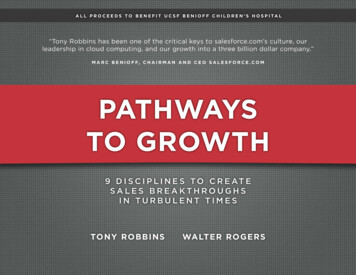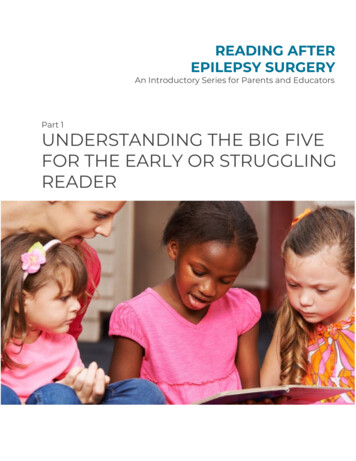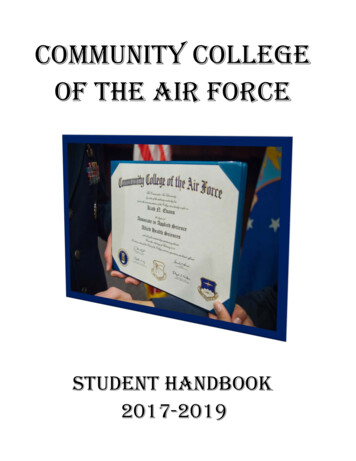
Transcription
Pathways2AudioScripts
Audio ScriptsTrack 4CD1Unit 1: Staying Healthy Inthe Modern WorldLesson ABuilding VocabularyTrack 2A. Meaning from ContextPage 4Word Endings -s and -esPage usessurprisesurprisesexercise exercisesThe Secret to a Long LifeTrack 5What's the secret to a long, healthy life? It begins withgenes, but also depends on good habits. Expertsstudied groups of people living in places where manypeople live to be 100 years old - including Sardinia, Italy,and Okinawa, Japan . People in these places suffer fromfewer diseases and are more likely to live to be 100 thanpeople in other parts of the world.Tara: Hello, everyone, and thanks for coming. I'dlike to introduce myself. I'm Tara Sorenson, and I'ma public health nurse. Public health nurses are likeother nurses, but we take care of more than oneperson. Our job is to keep everyone in the communityhealthy. I know-it 's a big job! Mostly, I do this througheducation . Tonight , I have 45 minutes to teach youabout heart disease .SardiniaIn Sardinia, many people, especially men, live longerthan in other parts of the world. In general, womenlive longer than men. In fact, in the United States,there are four times as many 100-year-old womenas men. However, in Sardinia, an equal number ofmen and women live to be 100. One of the reasonsmay be that men have a stress-free life there . Themen typically work in the hills, which provides dailyexercise and helps keep them strong. The womenlook after the house and money. "I do the work,"says Tonino, a native Sardinian. "My wife does theworrying."OkinawaIn Okinawa, people have very low rates of cancer andheart disease compared to Americans. One of thereasons for this is ikigai, a Japanese word that translatesto "reason for living ." Ikigai may help prevent stress,which can cause high blood pressure. Okinawans alsoeat a healthy, low-calorie diet that consists of a lot offresh vegetables. "A full plate of Okinawan vegetables,tofu, and a little fish or meat has fewer calories than asmall hamburger," says Makoto Suzuki of the OkinawaCentenarian Study. "And it will have many more healthynutrients."Developing Listening SkillsPronunciationTrack 3A.Page 61. Frank exercises every day. He plays sports and liftsweights.2. There are 16 doctors and 37 nurses at the hospital.B.Page 6Listening: A Talk about PreventingHeart DiseaseTrack 6A.Page 7B. Listening for Main IdeasC. Listening for DetailsTara: Hello, everyone, and thanks for coming . I'd like tointroduce myself. I'm Tara Sorenson, and I'm a publichealth nurse. Public health nurses are like other nurses,but we take care of more than one person. Our job isto keep everyone in the community healthy. I know-it'sa big job! Mostly, I do this through education. Tonight,I have 45 minutes to teach you about heart disease.There are different kinds of heart disease, but tonightwe're talking about coronary heart disease-the kindof heart disease that can cause a heart attack. Heartattacks happen when arteries or other blood vesselsbecome too narrow. If they 're too narrow, bloodvessels can't bring enough blood and oxygen to theheart, and this causes a heart attack. The good newsis-there are many things you can do to prevent heartdisease. The first step is pretty easy-get your bloodpressure checked. High blood pressure is bad for yourblood vessels, and it can lead to heart disease. So,if you do have high blood pressure, you need to dosomething about it. For example, if you're overweight,losing five or 10 pounds could help lower your bloodpressure. And you probably already know this-youcan lose weight by eating a healthy diet and gettingenough exercise. Let's talk about diet first. . Now,I'm not talking about a special diet where you eat onlyapples and lemons for a week-nothing like that! I'mtalking about healthy eating habits-how you eat mostof the time. According to government reports, theseAUDIO SCRIPTSI 101
habits can keep your weight and your blood pressuredown , and they can help to prevent heart disease.First, eat several servings of vegetables and fruits everyday. Second, eat less salt and less sugar. Third, chooselow-fat dairy products such as low-fat milk, yogurt,and cheese. Fourth, eat healthy protein foods suchas fish and eat only small amounts of red meat. Andfifth, choose whole grains when you eat foods suchas bread and rice. These are things you can do everyday-or at least most of the time. I know-nobody isperfect, right? In addition, these healthy eating habitscan help control your blood sugar. High blood sugaris another cause of heart disease. Now, let's talkabout exercise. I suggest exercising at least four daysevery week , for at least 30 minutes . And not just easyexercise. You should be breathing hard, and your heartrate should be beating faster than usual. Not too fast,of course, but faster than usual. This will make yourheart stronger and make you healthier. Besides highblood pressure and high blood sugar, another commoncause of heart disease is smoking. I guess everyoneknows it's a very unhealthy habit, and if you want toprevent heart disease, you have to quit smoking. It'salso important to get enough sleep, and to find healthyways to deal with stress. After all, we have jobs andchildren and other things that make us feel stressedout. So , go for a walk or take a yoga class! Then makea healthy dinner for your family. If you do these things,you will be much less likely to have coronary heartdisease in the future. Of course, some people do needmedication to control their blood pressure or bloodsugar, so it's important to visit your doctor regularly. Allright . . are there any questions? . Yes, the man inthe back .Exploring Spoken EnglishLesson BBuilding VocabularyTrack 9A. Meaning from ContextWhat are allergies? If you have a particular allergyto something, you become sick, or have an allergicreaction, when you eat. smell, or touch it. Many peoplehave allergies to pollen. The diagram below shows whathappens when there is an allergic reaction to pollen .1. First, pollen enters the body through the nose.2. Second, the body's immune system responds to thepollen with IgE antibodies. These antibodies attach toa mast cell. A mast cell is a cell that usually defendsyour body against health problems.3. The next time the same pollen enters the bOdy, theIgE antibodies "tell" the mast cell. The mast cell"thinks" there is a problem and tries to defend thebody.4. When this occurs, the mast cell produces substancesin the body that cause allergic reactions such assneezing , itching, and breathing problems.Using VocabularyTrack 7 A. Prior KnowledgeTrack 10Page 8SpeakingTrack 8C.Page 11Hello, my name is Megan Schwarz. To stay healthy,I exercise-but not every day. I usually exercise fouror five days a week. I also take vitamins every day.AUDIO SCRIPTSPage 14AllergiesGrammar: Adverbs of FrequencyManuel: I always drink plenty of water before I exercise.Jenny: I never ride my bike without wearing a helmet.Samir: I usually warm up for five to 10 minutes beforeI exercise.Monica: My friends and I often bring healthy snackssuch as fruit and peanuts when we go hiking.Erik: I always make sure to wear comfortable clothing.I don't want to be too hot or too cold .102 IFor exercise, I usually go jogging two or three times aweek. And I also walk, of course-I walk to classevery day, actually. Sometimes I go biking, but I don'thave my own bike, so I can only ride on weekends inthe park. They rent bikes in the park on Saturdays andSundays. In the future, I want to have a healthier diet.Now, I live in a very small apartment with no kitchen. I eata lot of fast food because I can't cook for myself. AfterI graduate, I plan to move to a bigger apartment with akitchen. I also want to buy my own bike, so I can bikeevery day. Thank you very much.C. Meaning from ContextPage 15Allergies and the Hygiene HypothesisMany people work very hard to keep their housesclean. But can too much cleanliness cause healthproblems? One theory is that dirt is good for us.Dirt on farms, for example, contains substances thatexercise our immune systems when we're very young.Research shows that allergies are not commonamong people who live with farm animals. Of course,there are many causes of allergies. For example, ifyour parents have allergies , you're more likely to havethem , too . The pressure and stress of modern lifecould be another cause. But if the hygiene hypothesi sis correct, it might be a good idea to have a cow atyour house-or at least not to worry so much aboutcleanliness.
Developing Listening SkillsExploring Spoken EnglishListening: An InformalConversationGrammar: Tag QuestionsTrack 11A. Listening for Main IdeasB. Listening for DetailsTrack 12Page 16Raymond: I had no idea that allergies were so serious.And so common!Elena: Yeah, they are. I'm allergic to strawberries,peanuts, and chocolate-and I love chocolate.Raymond: Wow-allergic to chocolate-that must bereally hard.Elena: It is. Are you allergic to anything?Raymond: No, at least not that I know of. I don't reallyknow much about allergies . . . fortunately.Elena: Yeah, you're lucky. My allergies are reallybad sometimes, especially in spring and earlysummer . . and I also have asthma.Raymond: Oh, you have asthma, too? It can't be easyfor you living in the city with all this air pollution then,can it?Elena: Well, the air pollution is bad, but I find it muchharder to be around smoke. It's really hard for me tobreathe. . I also can't be around cats for too long and some kinds of flowers also cause my asthma to actup. Fortunately, my asthma medication works reallyquickly, and I feel better almost immediately.Raymond: Well , that's good. What about food allergies?Those can be really bad too, can't they?Elena: You bet. Like I said, I'm allergic to chocolate,strawberries, and peanuts.Raymond: I'd hate to be allergic to chocolate. I can't livewithout chocolate.Elena: Well, believe me, it's not easy, but being allergicto peanuts is actually harder because you don't alwaysknow when food contains peanuts or peanut oil .Raymond: Yeah , that's true. Actually, yesterday in classProfessor Martinez was telling us that there is a no peanuts policy here on campus-because allergies canbe really dangerous.Elena: Yeah, that's right. The cafeteria and snack barstopped serving foods that contain peanuts and peanutoil last year after a student had an allergic reaction andwas rushed to the hospital.Raymond: Oh, yes . I remember that. ProfessorMartinez called food allergies the "new" allergyproblem.Elena: Yeah , that's right , and she also said that therewere twice as many children with food allergies in2002 than in 1997. I think it's called the new allergyproblem because it's growing very quickly. I read thatnowadays, about six percent of children have foodallergies.Raymond: Six percent! Wow, that's a lot of kids!Elena: It sure is!1.2.3.4.5.6.A., B.Page 18John took the bus, didn't he?They're tired, aren 't they?You called her last night, didn't you?Tina likes pizza, doesn't she?That man is your friend, isn't he?He's late again, isn't he?Unit 2: Energy andOur PlanetLesson ABuilding VocabularyTrack 13A. Meaning from ContextPage 24The Process of Global Warming1. Our demand for fossil fuels such as oil and naturalgas is growing.2. This growing need for energy causes us to burnmore and more fossil fuels.3. Burning fossil fuels such as coal puts carbon intothe air.4. Carbon dioxide, or CO 2 , and other gases reduce theamount of heat that goes out into space.5. When less heat goes out into space, it means thatmore heat stays in the earth's atmosphere.6. When more heat stays in the earth's atmosphere,the average temperature increases, making itwarmer.7. A significantly higher average temperature leads toclimate change and changes to the weather.S. Climate change can have a negative impact onpeople's lives. For example, climate change canmake it difficult to grow food in some places.9. People are starting to conserve energy by makingchanges that cause them to use less fuel.For example, people are buying smaller cars .10. Smaller cars are more efficient because they useless gas and oil.Developing Listening SkillsPronunciationTrack 14 Stressing Key WordsPage 26Where is Karen going?Is the meeting in Simpson Hall?No, the meeting is at the Student Union this week.AUDIO SCRIPTSI 103
Track 15PronunciationPage 26Katelyn: Are you going to the Environmental Clubmeeting?Dan: Maybe. What is it about?Katelyn: It's a presentation about energy around theworld. A photographer is going to talk about differentfamilies and how they live.Dan: Sounds interesting! What time is the meeting?Katelyn: It starts at seven.Dan: Is it in the science building?Katelyn: No, it's at the Student Union this time.Listening: A PowerPoint LectureTrack 16 A. Listening for Main IdeasB. Listening for DetailsPage 27Well, it's just about seven o'clock, so why don't weget started . So, hello and good evening everyoneand thank you for coming . I'm Carl Jones, andtonight I'm going to talk to you about energy usearound the world. Instead of talking in general terms,I decided to focus on three families from three differentcountries and discuss how each family uses energyin their daily lives. Can everyone hear me OK? OK,good. First, let's look at the Chuma family, in a villagein Botswana. Mr. Chuma is a tour guide and thefamily also raises cows. In this slide, you can seeMrs. Chuma doing some of her housework outside thefamily's small house. She washes her clothes by hand,and then she hangs them in the sun to dry. She isn'tusing any fossil fuels to wash and dry, which meansshe isn't sending any greenhouse gases into theatmosphere. In the next slide, you can see three of theChumas' children and their neighbors' children goingto school. The children walk there, and in the rainyseason they have to use this boat to cross the river.Again, you can see they aren't using much energy,so they aren't producing much carbon. Overall, theChumas' demand for fossil fuels is quite low. Theyuse fossil fuels for a few important things, such aselectric lights and a radio, so as a family, they havea fairly small impact on the environment. But globalwarming is having a significant impact on the peopleof Botswana, and the Chuma family is one example ofthis. Sometimes they don't have water . and thereisn't enough grass for their farm animals because ofthe dry climate. l\Jow, let's look at the next family-theNelsons. The Nelsons live in Las Vegas, in theUnited States. Here, in this slide, you can see BrandiNelson with her laundry. She's listening to the newson a big TV while she folds laundry in their living room.She washed and dried these clothes in a machine,and there are many other things in their house that useelectricity. In the next slide, you can see the Nelsonchildren coming home from school. They attend aprivate school. The Nelsons drive them to school104 I AUDIO SCRIPTSbecause there isn't a bus. Brandi and her husband areentertainers, and they both drive to their jobs becauseit's faster than public transportation. Their jobs arefar from their home, so they use about a gallon ofgasoline every day. The Nelsons want to conserveenergy, and have done several things to help reducethe amount of energy they use. For example, this yearthey bought more efficient appliances. They also wantto put in a solar energy system in their house, but it'svery expensive. Their lifestyle puts a lot of carbon intothe atmosphere, but they say it's difficult to changetheir habits . Finally, we have the Panchal family.This is Neetu Panchal, who lives in Jaipur, India. Thereare 11 people in her family, all living in one house. Theyhave a washing machine, but she hangs her clotheson the top of her house to dry. The Panchals aresaving money to build another room in their house forNeetu's cousin and his wife. Neetu's sister, Lalita, goesto work by bus. Here she is in this next slide here .Lalita works in a hotel far from their home. It takes her40 minutes to get there. She hopes that the family willsoon buy a car, so she can spend less time gettingto work and more time at home with her family. Indiahas a very big middle class-more than 300 millionpeople. Changes in the lifestyles of India's middleclass will have a big impact on the world's greenhousegases. For instance, by 2050, there will be about 600million cars in India-more than any other country inthe world . . and as the demand for cars increases,so will the demand for oil and gas.Lesson BBuilding VocabularyTrack 17A. Meaning from ContextPage 34Tips for Saving Energy and Protecting Our EnvironmentScientists believe that the earth's temperature isincreasing. They believe this increase in temperature ishaving a negative impact on our environment. You mightthink that protecting the planet is too big a job for you,but it isn't. There are many small and practical ways youcan conserve energy and help protect the environment.Here are some helpful tips. Cut back on driving by takingpublic transportation or walking more often. You willsave a lot of gas if you drive to work two or three daysa week instead of five! Shop at local stores close toyour home. You will drive less, so you can spend lessmoney on gas and more money on food. Turn off lightsand electronics when you aren't using them so youdon't waste electricity. Replace your old appliances likerefrigerators and dishwashers with new, efficient models.Old appliances consume more energy than new ones.Keep track of the electricity and gas you use and howyou use it. Write down the different activities you dothat use gas or electricity and how often you do them
in an energy journal. Use your energy journal to helpyou set a lower target for your energy use each month.For example, if your energy bill is 100 one month,try lowering your bill to 80, or by 20 percent the nextmonth . Try to reduce the amount of energy you use bymaking gradual changes to your lifestyle. You will seethat making small changes each month can have a bigimpact on the amount of energy you use-and helpprotect our beautiful planet!Developing Listening SkillsPronunciationTrack 18 Using Intonation to Show FeelingsPage 36Our energy bill is 200 dollars this month.Our energy bill is 200 dollars this month.Track 19 A., B.Page 361. Speaker A: The earth's temperature might increaseby five degrees.Speaker B: The earth's temperature might increaseby five degrees.2. Speaker A: Americans produce twice as muchcarbon as Europeans.Speaker B: Americans produce twice as muchcarbon as Europeans.3. Speaker A: Oh, you bought a new TV.Speaker B: Oh, you bought a new TV.Listening: An InformalConversationTrack 20A. Listening for Main IdeasPage 37Daughter: What's the matter, Dad? You look kind ofupset. .Father: Well, I am kind of upset. Our energy bill is veryhigh this month.Son: Really, how much is it?Father: It's 400 dollars, which is a lot higher than usual.Son: Wow-that sounds like a lot!Father: Well, it is a lot. I'd really like to find ways to cutback on how much energy we use.Track 21B. Listening for Details, C.Son: I do not! You take longer showers than I do. Maybeyou should stop using your hair dryer every morning. Thatprobably uses a lot of electricity, and it's noisy.Daughter: I don't use it every morning.Father: Kids! You don't have to start taking shortshowers or stop using the hair dryer, but we do needto try to reduce the amount of energy we use. I thinkwe should keep track of how we're using energy everymonth-you know, write it down . . Then we can seta target-for example, maybe we try to decrease theamount of energy we use by 10 percent next month.Son: How are we going to do that?Father: Well . . we can all try to think of ways to cutback. What do you guys think we can do?Son: I know! We can put in solar heating panels!Father: Well, that might save energy, but solar panelsare expensive. That's an interesting idea, Jason, but let'stry to think of little things we can do every day. Changeswe can start making immediately.Daughter: Well, OK . for one thing, we havethree computers here at home-so, we should try toremember to turn them off at night . That could help.Father: Good idea, Diana. OK, let's try to think ofsome more ideas. You kids have some good ones.Daughter: Oh-maybe we can try to use some of ourappliances, like the stove and oven less often.Son: What-you want us to eat cold food every day?Daughter: No! I didn't say that, but maybe we shouldeat sandwiches or salads for dinner sometimes insteadof cooking every night. Cooking probably uses a lot ofenergy.Father: OK, kids . That's a good idea, Diana, but Idon't think we have to stop eating cooked foodfor dinner. We just need to think more carefully abouthow we're using energy and make some changes,and they can be small, gradual changes. Let'ssee . for example, this month we can replaceour light bulbs with more energy-efficient ones andremember to turn off our computers at night-thosewere two great ideas you kids had . Then nextmonth we'll look at the bill and see how much we'vesaved. Then we can decide what to do next. Soundlike a plan?Son: Yeah!Daughter: Uh-huh!Page 37Son: Well, we can help think of some ideas . likelast week in school we learned about energy efficient light bulbs. Maybe we should get someof those?Father: Well, that's a start. Thanks, Jason . . I'm sureour local hardware store sells them, or maybe even thegrocery store.Daughter: I have an idea-Jason should take shortershowers. He takes really long showers and that probablywastes a lot of energy!Unit 3: Culture and TraditionLesson ABuilding VocabularyTrack 22A. Meaning from ContextPage 441. Women in Japan still wear a kimono for theirwedding. They haven't stopped wearing thesebeautiful clothes.AUDIO SCRIPTSI 105
2. In Korea, people eat traditional food such as ricecakes on New Year's Day. They have done this for along time.3. We are developing a program to teach foreignersabout our culture. Now we are making plans for thisprogram.4. In my country, we have a custom of giving moneyto children on their birthdays. We usually give themmoney.5. In the future, many languages might disappear.No one will speak these languages.6. A group of people called the Inuit live in the coldregions of the world . They live in cold areas.7. The Navajo people use storytelling to help preservetheir language and traditions. They use storytellingto keep their language and traditions.8. Some kinds of animals, such as tigers, areendangered today. They might all die.g. Scientists estimate that there are over 7000languages in the world. They don't know the exactnumber.10. Television is a factor in cultural change. It is a causeof these changes.Developing Listening SkillsPronunciationTrack 23Reduced Function WordsPage 46Examples:I hear the phone ringing .There's a message for Molly.What are you reading?Track 24B.Page 46Professor Daley: One of the oldest traditions in Northand South America is the cowboy. As you know, cattleeat grass-a lot of grass-so a herd must be movedoften to new places with more grass. The people whomove them are called cowboys.Listening: A LectureTrack 25A. Listening for Main IdeasB. Listening for DetailsC. Making InferencesPage 47Professor Daley: OK, so let's continue . A lot ofpeople today think that the last cowboys disappeareda long time ago. It's true that there are fewer cowboystoday, and the cowboy way of life is endangered.Money is a big factor here. Cowboys usually don'tmake a lot of money for all the hard work they do, sofewer young people today want to be cowboys-it'snot an easy lifestyle. Even so, in some parts of theworld , cowboys still ride their horses, watch the cattle,106 I A UDIO S C RIPTSand practice traditional cowboy customs. A few yearsago, a photographer named Robb Kendrick traveledaround different regions of North America talking tomodern cowboys and taking photographs with a veryold kind of camera. He recorded their way of life in abook called Still: Cowboys at the Start of the Twenty First Century. Here are two of the cowboys that RobbKendrick included in his book. This is Tyrel Tucker-hewas 18 years old when Kendrick took this photograph.Tyrel was working on a ranch at that time. He wasborn in Wyoming, in the United States, and he wasriding horses before he could walk. He got his firsthorse when he was two years old . He worked as acowboy during his school vacations. Then his motherneeded help with the family ranch , so he left schoolat the age of 17. He was happy to do that. . . Tyrelwas working outside while all his classmates wereindoors playing computer games. His most difficult jobwas one winter when he and his older brother workedalone on a ranch in Arizona. He estimates they tookcare of 2300 cattle there, so it was a big job! Everyday from December to April, they rode their horses onover 150 square miles of land . an area the size ofa major city. Can you imagine that? And there wereno other people there. Tyrel and his brother lived in ashack with no electricity and ate the same food everyday: pancakes, sausages, potatoes, and hamburgers.Tyrel enjoyed the work and developed a love for beingoutdoors . Now let's take a look at the cowboysof Mexico. The cowboy tradition started in Mexicoin the 1600s, when Spanish people brought the firstcattle to the New World . Big ranches needed workersto take care of their herds of cattle. These men werecalled vaqueros, from the Spanish word vaca, whichmeans cow. The vaqueros started wearing big hats tokeep the sun off their faces and high boots to protecttheir legs. Later, some Mexican vaqueros movednorth into Texas, and their clothes became a part ofthe cowboy culture there. Wearing cowboy hats andboots is part of the culture that is still preserved todayin Texas and other parts of North America. TodayMexico has two kinds of cowboys. One kind calledcharros ride horses and compete in sports. The otherare the vaqueros that I just described, and who workwith cattle on the ranches, especially in the north ofthe country. The vaqueros still ride horses and liveoutdoors for many months at a time. This is a pictureof Manuel Rodriguez, a young vaquero in Coahuila,Mexico. Manuel started helping his father at La MoraRanch when he was only four years old. He was thefourth generation of his family to work at La MoraRanch . Manuel recently got married and moved to thecity, but he plans to move back to the countryside andwork as a vaquero again after his first child is born.OK, so from this we can see that the cowboy 's way oflife hasn't changed. That's because the work hasn'tchanged. Cowboys still ride horses because they can
get close to the cattle. Herds of cattle still need a lot ofgrass, so cowboys must keep moving them from oneplace to another. That's the job of the cowboy. It's thesame today as it was in the past.Exploring Spoken EnglishLanguage Function: Askingfor and Giving ClarificationTrack 26A.Page 48Emily: You said that Mexico had the first real cowboys.Are there still cowboys today?Professor Daley: Yes, there are. They're workers wholive with the cattle and take care of them. Some ranchesare very large and cattle need to be moved from place toplace, so yes, there are still cowboys.Li: You also talked about two kinds of cowboys inMexico. Could you explain that?Professor Daley: Sure. The most famous cowboys inMexico are the charras. They ride their horses in contestscalled charreadas. The other kind of cowboys are thevaqueras - the ones who work with cattle every day.Li: I still don't understand.Professor Daley: Let me explain. Some Mexicancowboys do it as a hobby, and others do it as a job.For the charros, it's mostly a sport, or a hobby. For thevaqueros, it's their work.Li: So, what you mean is that Manuel Rodriguez is avaquero, and not a charra.Professor Daley: Exactly!Emily: Do you mean that charras aren't reallycowboys?Professor Daley: No, charros are a part of the tradition,but many of them don't do it as actual work. What Imean is, they are cowboys-but it isn't a job.Lesson BBuilding VocabularyTrack 27A. Meaning from ContextPage 54Anthropology 106: Culture and MusicAssignment: Oral PresentationFor this assignment , you will select a kind of music fromanother country and teach your classmates about it.You should plan to do the following in your presentation:Describe how the music sounds. Does it have a nicemelody that's easy to listen to? Is the rhythm fast orslow? What kinds of instruments do the musiciansplay? Does the music typically have lyrics? Are the lyricsusually happy or sad? Play an example of the musicfor your audience so they can hear it. Explain whereand when people typically listen to this kind of music.Do they listen to it at weddings or on special holidays?Compare this kind of music to another kind of musicyou know about . How are they similar? Then contrastthe two kinds of music. How are they different? Defineany words you think your classmates may not know.In your conclusion, summarize the most importantideas of your presentation. Answer any questions andremember to thank your audience. Your presentationshould be at least two minutes.Developing Listening SkillsListening: An Assignmentand a Student PresentationTrack 28A. Note-TakingPage 57Professor: OK . . . Yesterday we listened to musicfrom Latin America. We heard some traditional music,and we also heard new music that developed fromthis traditional music. Now I'm going to ask you to dosome research and give a short presentation to theclass. In this presentation, you're going to do six things,so please take notes. First, I want you to select a kindof music from another culture to present. Then I wantyou to talk about the culture it comes from-got that?Next you should describe the music and explain whichaspects of this music are traditional and which aspectsare new, or modern. Then, I want you to compare andcontrast it with another kind of music we have
First, eat several servings of vegetables and fruits every day. Second, eat less salt and less sugar. Third, choose low-fat dairy products such as low-fat milk, yogurt, and cheese. Fourth, eat healthy protein foods such as fish and eat only small amounts of red meat. And fifth, choose whole grains when you eat foods such as bread and rice.
